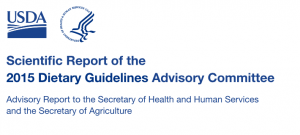Today the British Medical Journal (BMJ) published an editorial that attacks the science behind the U.S. Dietary Guidelines report. It’s a surprising development for several reasons: the BMJ is a prestigious journal, yet the piece contains several basic factual errors, and it arrives just as meat and sugar industry lobbyists are seeking ways to derail the 2015 Dietary Guidelines for Americans, which government officials are now in the  process of writing. The Guidelines have the potential to help prevent thousands of cancer and other chronic diseases.
process of writing. The Guidelines have the potential to help prevent thousands of cancer and other chronic diseases.
The piece, written by a journalist who last year published a book called The Big Fat Surprise: Why Butter, Meat and Cheese Belong in the American Diet, claims the report by the Dietary Guidelines Advisory Committee (DGAC) “does not take into account all the relevant scientific evidence” and is marked by an “overall lack of sound and proper methods.” It goes on to list several specific studies that weren’t included, and to question the inclusion of observational evidence that does not meet what it considers “established” methods of analysis.
Within hours, the article’s misleading statements earned this swift and spirited rebuke on the website The Verge. That post addresses the BMJ article’s errors in great detail, and we at AICR encourage you to read it.
It’s interesting to note that most of the BMJ’s criticism of the DGAC’s work deals with its conclusions regarding heart disease, as if that were their sole focus. But of course the Dietary Guidelines address much more. They lay out the basics of a healthful diet — one that focuses on foods and beverages that help achieve and maintain a healthy weight, promote health, and prevent disease. Which means they are designed to consider data on heart disease alongside evidence on cancer risk, diabetes, obesity and more.
That’s why it’s important for us to set the record straight on the BMJ’s critique of observational evidence – studies that track the diet and lifestyle of participants over a specific period of time without introducing an intervention.
AICR’s rigorous, transparent and comprehensive protocol for analyzing the global evidence considers observational data alongside interventions like randomized control trials. Mechanistic and laboratory evidence is also taken into account. There’s a very simple reason for this.
Our research, and the reports we produce, focus on cancer prevention, not cancer treatment. And prevention of a disease like cancer – which can take decades to develop – needs to be studied in various ways, because no single study design can produce all the answers we need.
Our expert reports and the Continuous Update Project (CUP) follow a clearly defined set of criteria for considering what evidence to include and how to collectively weigh it. They look for consistency across different studies, in different populations, by different investigators. When, according to a pre-specified set of criteria that include factors like the presence of a dose-response and a clearly defined underlying biological plausibility, they conclude that a link exists between a given food, dietary pattern or behavior, and risk for a given cancer.
The Dietary Guidelines Advisory Committee consulted our expert report and the CUP in reaching their conclusions, and we stand firmly and proudly behind our work. We know it to be the most exacting and thorough analysis of how diet, weight and physical activity affect cancer risk it is possible to produce.
And we fervently hope that today’s dismayingly misleading article does not deter US officials from producing the kind of evidence-based Dietary Guidelines that can improve American health and help save millions of American lives.
If you want to keep the Dietary Guidelines strong and evidence-based, find how to do that in our previous Lobbyists Move to Weaken the Dietary Guidelines.





